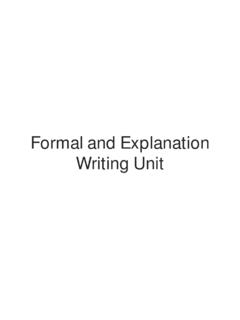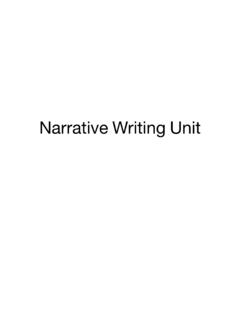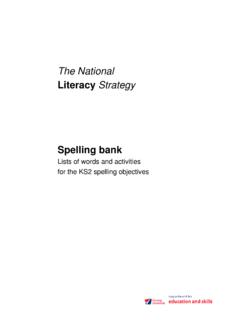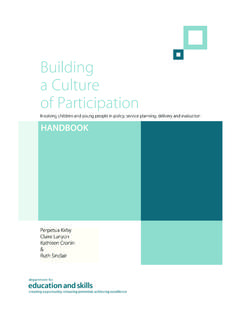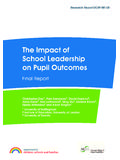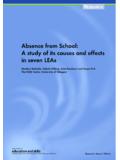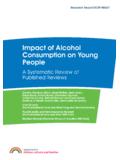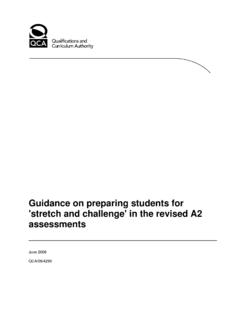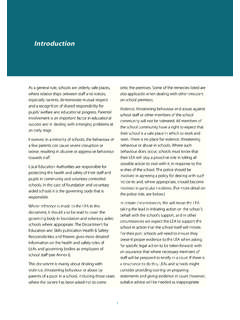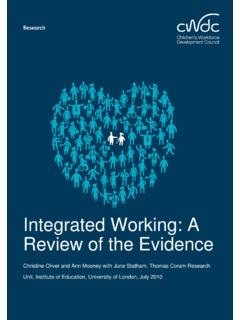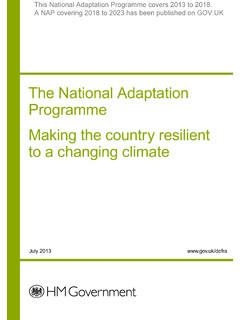Transcription of School discipline and pupil-behaviour policies – …
1 CMYKPMS ???PMS ???PMS ???PMS ???Non-print 1 Non-print 2 job location : prinergy 3 Non-printingColoursSchool discipline and pupil -behaviour policies Guidance for 107/04/2010 10:38 Contents1. Introduction purpose and coverage of this guidance 032. Statutory guidance for governors on their duties as regards the School behaviour policy 063. Non-statutory guidance for head teachers and other School staff 12 Developing the behaviour policy 12 Communicating the behaviour policy 17 The power to discipline : what it means 20 Regulating pupils conduct and disciplining them for misbehaviour outside School premises 23 Promoting and rewarding good behaviour 27 Punishing poor behaviour use of disciplinary sanctions 29 Detention 33 Confiscation (including retention and disposal) of inappropriate items 40 Taking account of individual pupil needs 444.
2 The rights and responsibilities of schools, pupils and parents in ensuring an orderly climate for learning 6001 212/01/2010 12:56 Separate DfES guidance is available on: Exclusions pupil Referral Units and Alternative Provision Commissioning, monitoring and quality assuring alternative provision School partnerships to improve behaviour and tackle persistent absence Learning Support Units Bullying Social and Emotional Aspects of Learning (SEAL) Pastoral Support Programmes Making reasonable adjustments for disabled pupils Attendance Penalty Notices, Parenting Contracts and Parenting Orders How to source parenting provision Involving Parents, Raising Achievement Violence reduction in schools Safer School Partnerships Use of Force The Use of Restrictive Physical Interventions for Pupils with Severe Behavioural Difficulties Weapons searches [published in May] National Programme for Specialist Leaders in Behaviour and Attendance (NPSL-BA)
3 Further references: Learning Behaviour: The Report of the Practitioners Group on School Behaviour and discipline Education and Inspections Act 2006 DfES Guidance 312/01/2010 12:5603 Introduction1. IntroductionPurpose of the This guidance aims to help schools understand their overall legal powers and duties as regards establishing a School behaviour policy and disciplining pupils. It also provides more specific advice on certain key sanctions (detention and confiscation). It does not, however, offer a definitive interpretation of the law: interpreting the law is a matter for the The guidance replaces earlier guidance provided by the National Strategies on School behaviour and attendance It focuses particularly on provisions in the School discipline chapter of the Education and Inspections Act 2006 (EIA 2006), which came into force on 1 April 2007.
4 These include provisions on School behaviour policies , the power to discipline , detention and confiscation. A separate chapter of the EIA 2006 sets out provisions on more specific issues around parental responsibility and excluded Some of the provisions in the EIA 2006, such as the statutory power to discipline , are new. Others re-enact or replace existing legal provisions. It is important that schools understand what these powers and duties mean for them in practical terms, and this is a key aim of the guidance. The Act clarifies and as appropriate strengthens schools powers to discipline , reducing the risk of misunderstandings and challenges to their disciplinary authority.
5 Schools are advised to review their existing policies in the light of this While the majority of pupils behave well and schools are generally orderly and productive places of learning, the Government is determined to support teachers and other School staff who have to deal with poor and disruptive behaviour. Poor behaviour blights the learning, and so possibly the life chances, of other pupils. It is also demoralising for School staff to have to deal with persistent disruption to their teaching and makes the job harder and less enjoyable.
6 This is This is not intended as a comprehensive guide to the wide range of topics relating to School discipline , pupil behaviour and attendance. A number of these (such as pupil exclusions, use of force, truancy, or tackling bullying) raise extremely sensitive and complex issues, which is why we have produced separate guidance on Primary National Strategy: developing and reviewing your whole- School behaviour and attendance policy and Key Stage 3 National Strategy: advice on whole School behaviour and attendance policy, published by the Department for Education and Skills in September 2003 (DfES 0759-2003 and 0628-2003).
7 Separate advice is available on School 412/01/2010 12 The guidance should however be seen as the centre piece to an overall suite of DfES guidance across the broad range of issues around School discipline , pupil behaviour and The guidance covers all the provisions in the School discipline chapter of the EIA 2006 except, for reasons already indicated, the use of The sections of this guidance on establishing, developing and communicating a pupil behaviour policy apply to all maintained schools, including pupil Referral Units (PRUs) and nursery schools, and non-maintained special schools.
8 This is because the relevant provisions in the EIA 2006 apply to those categories of School . All references to School in these parts of the guidance should be understood to be referring to all these categories of School , and references to head teacher should be understood to include the teacher in charge of Although these parts of the guidance do not apply to independent schools, including Academies and City Technology Colleges, such schools may nonetheless find the material contained herein helpful as regards how they might choose to develop their own School discipline and pupil behaviour The sections of guidance on the power to discipline , use of rewards and enforcement of sanctions (including detention and confiscation) apply to all schools.
9 This is because the relevant legal powers apply to any The guidance is aimed particularly at senior School leaders (governors, head teachers, and staff who may be given a specific responsibility as the lead behaviour professional within a School ) though it is relevant to all staff The Department strongly recommends that the content of this guidance be disseminated to staff through training sessions or continuing professional development (CPD) events. It is important, however, that there is an ongoing review of the School behaviour policy and disciplinary procedures; the content of the guidance should not be covered in one training event and then Many parts of this guidance refer to consulting or communicating with parents.
10 The definition of a parent for the purposes of the Education Acts is broadly drawn and includes any person who has parental responsibility (which includes the local authority where they have a care order in respect of the child) and any person (for example, a foster carer) with whom the child lives and/or the child s birth parent(s). Any reference to parent in this guidance should be understood as including any person with parental responsibility for the 512/01/2010 12:56 Statutory and non-statutory elements of the Section 88 of the EIA 2006 requires governing bodies of the relevant schools to have regard to guidance from the Secretary of State for Education and Skills (or, in the case of Wales, the Welsh Assembly) in making and reviewing the written statement of general principles on School discipline .
